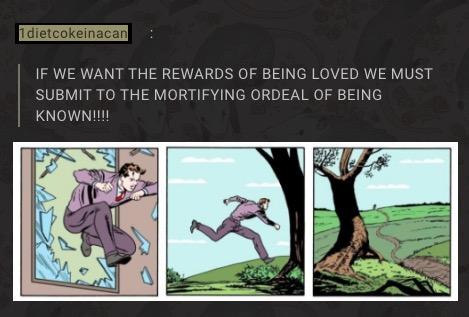176. The mortifying ordeal of being known

Reap the rewards of loving and being loved. Submit to the mortifying ordeal of being known. - Tim Kreider
You might have picked up on the fact that I like to overanalyze my relationships. Not every person I've ever crossed paths with - because that would surely drive me insane (well that might be a lie, there's so many people that kinda traumadump on the first encounter and at times I feel so overwhelmed, but most times I feel flattered). However, I think I overanalyze my connection with the the people I care about and those I feel truly at ease with.
I don't think I have a difficult time trying to make friends. Not to flex, of course. I think it's a natural knack of mine to navigate social spaces, like an unconscious algorithm working away in the background, finding the rhythm of every room. Maybe it's because I genuinely enjoy listening to people. For me, personally, I would like to cultivate more meaningful relationships, as this is a New Year's resolution for me this year. I feel like there is something gratifying about hearing the details of someone’s life, watching their expressions shift as they talk, seeing the puzzle pieces of their personality come together.
But with the people I really care about, it's different. I think there’s this part of me that feels responsible, almost like I have to figure them out completely, down to the last detail. I notice their little habits, their favorite phrases, how they react to certain jokes, the way they look when they're lost in thought. And once I see these things, they lodge themselves in my mind like little bookmarks. Maybe it's because I want to show them, in some indirect way, that I really care. Like, "Hey, I see you. I remember this about you."
Tim Kreider, in a piece for the New York Times, recounts a story where he was mistakenly cc'd on an email from someone who disapproved of his goats. This incident led him to reflect on the anxiety of knowing what others think about us behind our backs. He goes on to argue that it is not only possible, but perhaps necessary, to love someone despite their imperfections.
"THE operative fallacy here is that we believe unconditional love means not seeing anything negative about someone, when it really means pretty much the opposite: loving someone despite their infuriating flaws and essential absurdity."
I think about it often. It’s funny how, in relationships, we tell ourselves we want honesty, but sometimes honesty just feels like an invasion. Kind of like a crack in the illusion we carefully keep about how we’re perceived. There’s this instinct to curate our selves, hoping to appear just flawed enough to be relatable, yet not so much that it becomes disappointing.
I think there’s a sort of relief in that. To be truly known by someone, down to the scrapes and bruises on your personality, and still be chosen - there’s something achingly real and intimate about that. Maybe it’s why I overthink and overanalyze the people I love. Not because I expect them to be flawless, but because I want to love every inch of who they are, without illusion.
~ all knowing???
<3 K